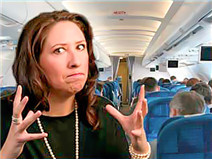高级课程第02单元第04课时

高级课程» 第2 单元» 第4 课时» 活动中心
1 Sensible Driving Can Save Fuel — Basic Story
The price of gas has been going up. We do not know when it will end. Many people want to know how they
can conserve fuel. The best way to conserve fuel is to change driving habits.
The accelerator, or gas pedal, has a lot to do with how much gas you use. The faster you drive, the more gas you
use. Drivers should slow down a bit to conserve fuel. Driving at a steady speed helps to save how much gas you
use. Accelerating slowly to get to the speed you want to go helps conserve gas too.
The more you drive your car, the more gas you use. Think about the places you need to go before leaving your
home. You should run as many errands that you need to do in one trip. Always try to pick the shortest route
when going somewhere.
Cars that are in good working condition use less fuel. Take care of your vehicle. Make sure the engine is
running well and is tuned-up often. Have a mechanic check it, if something seems wrong.
Tires are important too. Keep the tires inflated properly on a car. It will help the vehicle roll better and will get
you better mileage. If a car's tires are worn, then they should be replaced.
Finally, think about using your car less. Walk or ride a bike if you do not have far to go. Carpool or take public
transportation when you can. Leaving your car at home really saves gas.
There are many ways a person can conserve fuel. These are just a few ideas that can help you save money at the
gas pump. Try changing the way you drive and see how much it saves you!
2 Sensible Driving Can Save Fuel — Full Story
With gas prices spiraling upward and no end in sight, many motorists are wondering how they can conserve
fuel. The best answer appears to be a change in driving habits.
Here are some tips for cutting gasoline consumption:
- Drive slower. Keeping highway speed to 55 mph uses 21 percent less gasoline than racing down the freeway
at 70 mph.
- Keep your foot still. Driving at a steady speed can help conserve fuel.
- Accelerate slowly but steadily. The harder you step down on the accelerator, the more gas your engine is
going to drink.
- Shift gears. If you drive a manual shift vehicle, upshift before your engine "winds up." When driving at
highway speeds, change to highest gear as soon as possible.
- Roll up the windows. Open windows cause aerodynamic drag, reducing your mileage by as much as 10
percent.
- Think ahead. Almost everyone has to drive, but cutting unnecessary trips and consolidating errands can save
gas.
- Plan your route. Avoid curvy or hilly roads whenever possible. Climbing and turning force your engine to
work harder, resulting in poorer mileage.
- Stay on the pavement. Dirt or gravel roads can result in a mileage penalty of as much as 30 percent.
- Stay in sync. Stoplights are usually timed for a particular speed. Driving steadily at slightly below the legal
speed limit can allow you to hit a series of green lights.
- Watch that left foot. Even a slight pressure on the clutch or brake can make the engine work harder, exacting a
mileage penalty.
- Don't warm up. Prolonged warm up periods waste gas. Most cars can be driven cold, as long as they're not
immediately accelerated to high speed.
- Hit the gas station early. Your gasoline-buying dollar will go further if you fill up when at the coolest time of
the day. Gasoline is densest when the air temperature is low, giving you more bang for your buck.
- Tune it up. Cars that are regularly maintained run most efficiently and use the least gas. Be sure and replace
fuel and air filters frequently.
- Pump up your tires. Inflating tires to the maximum recommended level can reduce rolling resistance, resulting
in improved mileage.
- Sweat it out. Auto air conditioners can reduce fuel economy by as much as 20 percent.
- Drop some weight. Remove unnecessary items from the trunk and interior of your car. Every extra pound in
your car can decrease mileage.
- Consider the alternatives. Think about carpooling,taking public transportation, walking or riding a bike.
Nothing saves gas like leaving your car in the garage.
3 accelerator
the gas pedal in a car
4 conserve
use carefully; not wasteful
5 errands
short trips taken to do something
6 expensive
to cost a lot of money
7 fuel
a source of energy, like gasoline
8 habit
the way someone usually does something
9 inflated
full of air
10 route
the direction a person chooses to travel
11 speed
how fast or slow someone is going
12 steady
not changing much






